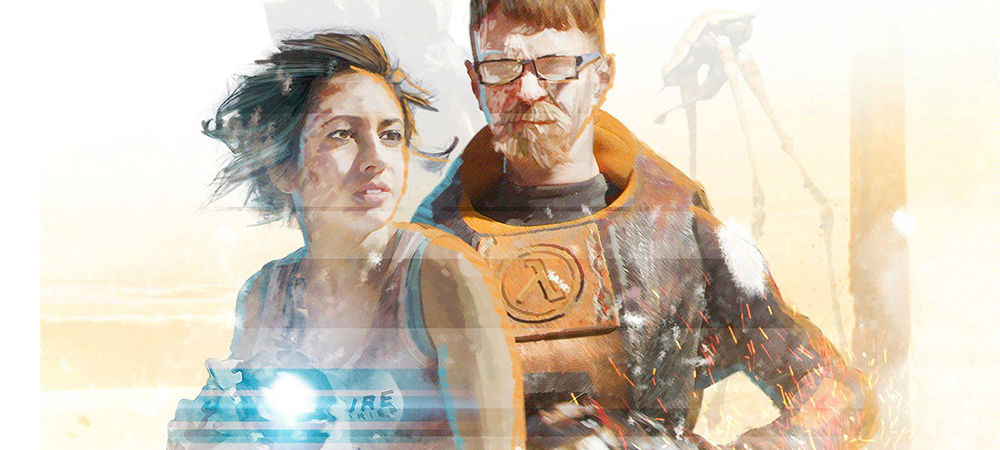It would require the hush-hush approach
With today’s somewhat startling revelation that J.J Abrams and Valve intend to collaborate on Half-Life and Portal movies comes speculation as to how these movies are actually going to work. Specifically, the notion that Abrams may have a difficult time staying true to the source material with regard to the protagonists.
While the Half-Life world will make for a fascinating setting for Hollywood to explore, Valve has made a habit of defining their main characters with one particular inaccessible character trait that wouldn’t lend itself all that well to the big screen.

Valve is well-known for having developed two of the most highly regarded videogame franchises of all-time — Half-Life and Portal. Despite the intertwining series’ seemingly bottomless well of lore, Valve took a somewhat counter intuitive approach to creating a robust, believable world. In an era when central characters have become increasingly chatty in efforts to enhance storytelling, Valve told stories through the sealed lips of silent protagonists.
Much has been said about Half-Life’s Gordon Freeman and Portal’s Chell over the years, but it’s interesting to note how Valve has taken decidedly unique approaches to the exposure of each respective character, and how it affects the lasting impressions that the player is left with.
Gordon Freeman, despite never speaking, is a very memorable hero. Valve’s decision to include his portrait on the box art of each game is a contributing factor, but the effect goes much deeper. Freeman’s legacy is cemented by the reactions of the world around him. Everywhere he goes, people marvel at his very existence. Leading up to the initial experiment gone awry at the beginning of Half-Life — the player’s first introduction to Freeman — Valve paints their intentions for Freeman with broad strokes through the various Black Mesa personnel’s acknowledgements of him. Specifically, the entire facility seems to hinge upon his arrival to partake in the experiment in the testing chamber.

A lot of Half-Life is a “Lone Wolf” story, but once Freeman closes the portal to Xen and saves the world, these reactions are exponentially compounded, and rightfully so. Throughout the entirety of Half-Life 2, HL2: Ep. 1, and HL2 Ep. 2, it seems as if each new character met comes standard equipped with a glowing verbal exaltation of Freeman. Truth is, the praise is well-deserved. He’s the reason the world still exists (albeit, not under optimal living conditions). He’s the face of the Resistance. He’s the shining pillar of hope in a sea of despair.
Throughout the entirety of the Half-Life canon, non-playable characters consistently rely upon Freeman. At all times, through Freeman’s very actions, there is both the implication and the very realistic realization that he is humanity’s savior. Not too shabby for a physicist with a crowbar.
With Gordon Freeman, Valve has been able to develop a surprisingly deep character despite a complete void of dialogue and emotion. They have been savvy enough to create Freeman based entirely around one-sided interactions. But, to their credit, it works to perfection, and Freeman is rightfully regarded as one of the strongest and most recognizable characters in videogames.

Portal’s Chell is an entirely different story. In spite of also being a silent protagonist, she differs from Freeman in that she may be the very essence of a forgettable character. Like Freeman, Chell’s legacy is also cemented by her surroundings. However, her environment is abandoned (save for a sentient robot), and her character development directly reflects it.
If asked to name the identifying features of Portal and Portal 2, most would immediately default to the puzzles, GLaDOS, the turrets, or a handful of other core characteristics. Almost no one would actually describe Chell, the one facilitating the entire experience.
The reason for this is that Valve has kept the audience relatively in the dark as to who Chell really is. Only through extensive research and minute details do we have an idea what her backstory is, and even that isn’t necessarily 100% confirmed. We aren’t given the opportunity to view Chell, except through the manipulation of portals. It’s almost as if Valve doesn’t view her so much as a character, but rather as a vessel for the experience to be had through.
Instead, Valve seems to be more intent on telling the story of Aperture Science than the story of Chell. It would appear that, to them at least, the history of Aperture Science and Cave Johnson, and the scientific arms race to develop portal technology between Black Mesa and Aperture Science, were the important takeaways for the audience. Chell was just their way of getting those points into the players’ heads.
Through similar means, Valve has created two drastically different main characters for their Black Mesa/Aperture Science realm. Gordon Freeman has most of the classic characteristics of a strong action hero, but remains unique enough that the players care about his saga. Chell, on the other hand, is almost completely nondescript. She is so entirely overshadowed by her charming and idiosyncratic surroundings that it’s easy to forget that she exists at all. Despite these distinctly different levels of character development, both franchises are universally critically-acclaimed and beloved by the public. It definitely seems as if all silent protagonists are not created equal.
With Abrams pursuing Half-Life and Portal movies, it almost certainly will require him to opt out of using a speaking lead role. Silence is too engrained into the very nature of both Freeman and Chell; adding voice would risk undoing the entire essence of who they are. At least one thing’s for sure — the dialogue will be easy to write.
[Main image by Michael Shanks, for the short film When Gordon Met Chell]








